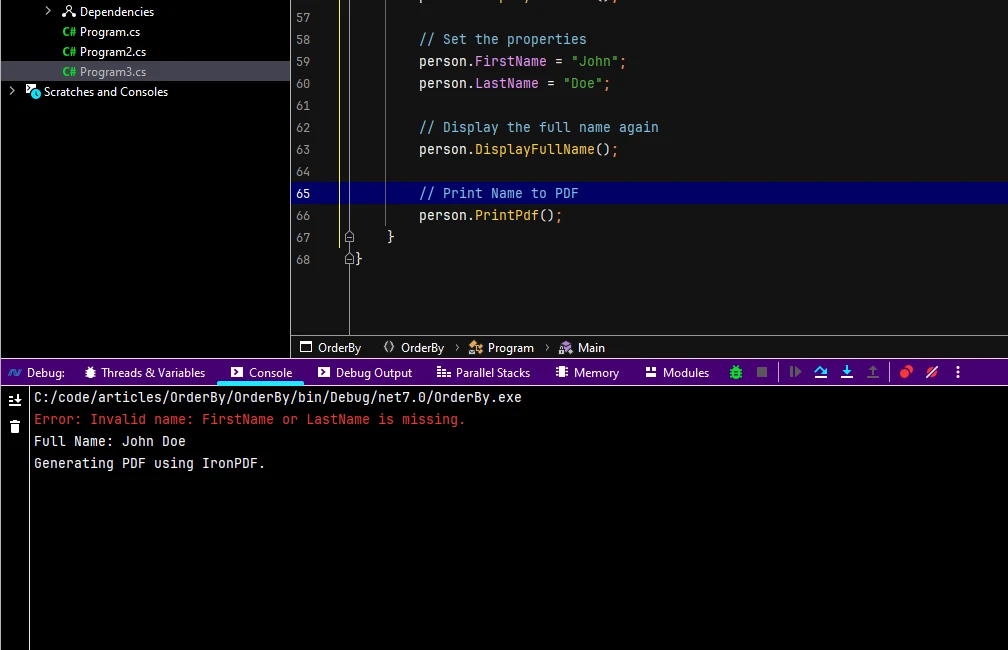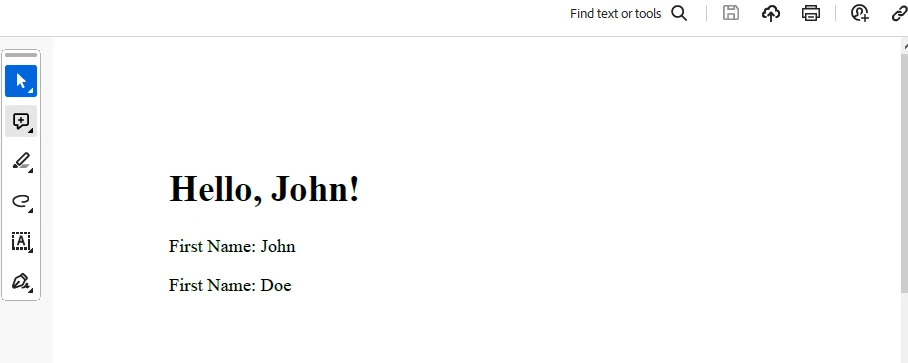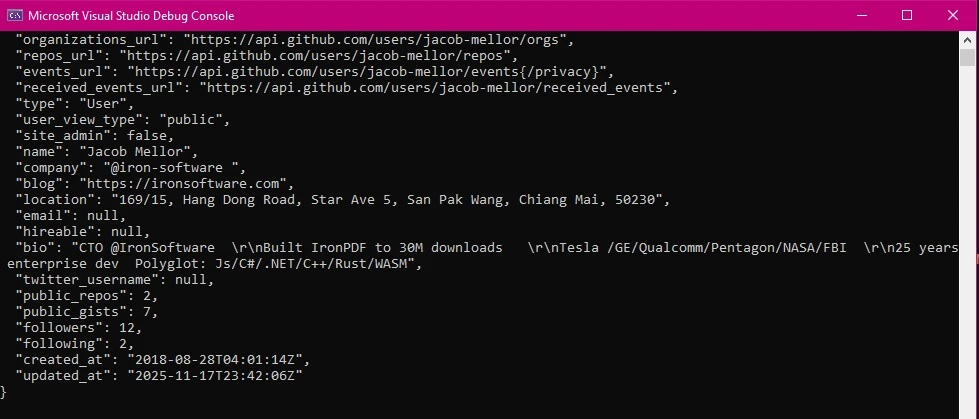C# Nameof (How It Works For Developers)
The 'nameof' operator, introduced in C# 6.0, is a compile-time construct designed to address the challenge of referring to program elements by their names and silently broken runtime behavior. Its primary purpose is to eliminate the need for hardcoded strings, offering a more maintainable and error-resistant approach. In this article, we will explore the nameof operator in C# and also introduce the IronPDF Library on NuGet library to generate PDF documents programmatically.
Basic Syntax of 'nameof' Operator
The fundamental syntax of the 'nameof' operator is simple. It takes an element as an argument and returns its name as a string. Consider the following example:
static void Main()
{
// Declare a string variable
string myVariable = nameof(myVariable);
Console.WriteLine(myVariable); // Output: "myVariable"
}static void Main()
{
// Declare a string variable
string myVariable = nameof(myVariable);
Console.WriteLine(myVariable); // Output: "myVariable"
}In this case, 'nameof(myVariable)' yields the string "myVariable". The operator can be applied to various code elements, including variables, types, members, and more.
Benefits of 'nameof' Operator
Code Maintainability
One of the standout advantages of the 'nameof' operator is its positive impact on code maintainability. Instead of hardcoding names as strings, developers can use 'nameof,' ensuring that references automatically update when names change.
static void Main()
{
// Without using nameof
Logger.Log("Error: The variable 'myVariable' is null.");
// Using nameof for improved maintainability
Logger.Log($"Error: The variable '{nameof(myVariable)}' is null.");
}static void Main()
{
// Without using nameof
Logger.Log("Error: The variable 'myVariable' is null.");
// Using nameof for improved maintainability
Logger.Log($"Error: The variable '{nameof(myVariable)}' is null.");
}Compile-Time Safety
'nameof' enhances compile-time safety by eliminating the risk of typos or inconsistencies in names. Any misspelling or modification of a variable name triggers a compile-time error, reducing the chances of runtime issues.
static void Main()
{
// Compile-time error if 'myVariable' is misspelled
string myVariable;
string variableName = nameof(myVariable);
Console.WriteLine(variableName);
}static void Main()
{
// Compile-time error if 'myVariable' is misspelled
string myVariable;
string variableName = nameof(myVariable);
Console.WriteLine(variableName);
}Refactoring Support
The 'nameof' operator seamlessly integrates with refactoring tools, providing a hassle-free experience when renaming variables, types, or members. All 'nameof' references are updated automatically.
static void Main()
{
// Before renaming local variable 'myVariable' to 'newVariable'
string myVariableNameChange = nameof(myVariableNameChange);
// After renaming local variable 'myVariable' to 'newVariable'
string newVariableNameChange = nameof(newVariableNameChange);
Console.WriteLine(newVariableNameChange);
}static void Main()
{
// Before renaming local variable 'myVariable' to 'newVariable'
string myVariableNameChange = nameof(myVariableNameChange);
// After renaming local variable 'myVariable' to 'newVariable'
string newVariableNameChange = nameof(newVariableNameChange);
Console.WriteLine(newVariableNameChange);
}Enhanced Debugging
During debugging, 'nameof' makes code more informative and readable. Logging statements, exception messages, and other debug outputs become concise and contextually relevant.
static void Main()
{
// Without using nameof
// throw new ArgumentNullException("myVariable", "The variable cannot be null.");
// Using nameof for improved debugging
throw new ArgumentNullException(nameof(myVariable), "The variable cannot be null.");
}static void Main()
{
// Without using nameof
// throw new ArgumentNullException("myVariable", "The variable cannot be null.");
// Using nameof for improved debugging
throw new ArgumentNullException(nameof(myVariable), "The variable cannot be null.");
}Here the throw new ArgumentNullException throws an exception if the variable is not declared.
Practical Use Cases of 'nameof' Operator
Reflection
When working with reflection, the 'nameof' operator simplifies obtaining the names of types, properties, or methods without using hardcoded strings.
Type type = typeof(MyClass);
string typeName = nameof(MyClass);Type type = typeof(MyClass);
string typeName = nameof(MyClass);The example class MyClass can be a hard-coded string, but we can use reflection to get the class name dynamically. The variable type has the class name, and then the nameof keyword is used to get the name of a class instance. They are not the same name.
Logging and Exception Handling
'nameof' proves invaluable in logging statements and exception messages, making them more readable and less error-prone.
Logger.Log($"Error: The property '{nameof(MyClass.MyProperty)}' is out of range.");Logger.Log($"Error: The property '{nameof(MyClass.MyProperty)}' is out of range.");Example
In this example, we'll create a simple class representing a Person, and we'll use the nameof operator to improve logging and error messages.
using System;
class Person
{
public string FirstName { get; set; }
public string LastName { get; set; }
// Method that displays the full name of the person
public void DisplayFullName()
{
if (string.IsNullOrEmpty(FirstName) || string.IsNullOrEmpty(LastName))
{
LogError($"Invalid name: {nameof(FirstName)} or {nameof(LastName)} is missing.");
}
else
{
Console.WriteLine($"Full Name: {FirstName} {LastName}");
}
}
// Custom error logging method that highlights errors
private void LogError(string errorMessage)
{
Console.ForegroundColor = ConsoleColor.Red;
Console.WriteLine($"Error: {errorMessage}");
Console.ResetColor();
}
}
class Program
{
static void Main()
{
// Create an instance of the Person class
Person person = new Person();
// Attempt to display the full name without setting the properties
person.DisplayFullName();
// Set the properties and display the full name again
person.FirstName = "John";
person.LastName = "Doe";
person.DisplayFullName();
}
}using System;
class Person
{
public string FirstName { get; set; }
public string LastName { get; set; }
// Method that displays the full name of the person
public void DisplayFullName()
{
if (string.IsNullOrEmpty(FirstName) || string.IsNullOrEmpty(LastName))
{
LogError($"Invalid name: {nameof(FirstName)} or {nameof(LastName)} is missing.");
}
else
{
Console.WriteLine($"Full Name: {FirstName} {LastName}");
}
}
// Custom error logging method that highlights errors
private void LogError(string errorMessage)
{
Console.ForegroundColor = ConsoleColor.Red;
Console.WriteLine($"Error: {errorMessage}");
Console.ResetColor();
}
}
class Program
{
static void Main()
{
// Create an instance of the Person class
Person person = new Person();
// Attempt to display the full name without setting the properties
person.DisplayFullName();
// Set the properties and display the full name again
person.FirstName = "John";
person.LastName = "Doe";
person.DisplayFullName();
}
}Explanation
- We have a
Personclass withFirstNameandLastNameproperties and a methodDisplayFullNamethat checks if both properties are set before displaying the full name. - Inside the method
DisplayFullName, we usenameof(FirstName)andnameof(LastName)to refer to the property names as string literals. This improves code readability and ensures that if the property names change, both the property definition and the corresponding error message are automatically updated during compilation. - The method
LogErrortakes advantage ofnameofto include the property name dynamically in the error message. - In the
Mainmethod, we create an instance of thePersonclass, attempt to display the full name without setting the properties, and then set the properties and display the full name again.
When you run this program, you'll see that the error message dynamically incorporates the property names, providing more context and making it easier to identify which property is missing.
This example demonstrates how the nameof operator improves code maintainability by automatically updating references when property names change and enhances error messages with more informative details during development.
Introducing IronPDF
IronPDF for C#.NET is a PDF library from Iron Software that can be used as a PDF generator and reader. Here we introduce basic functionality. For more information, refer to the documentation.
IronPDF’s standout feature is its HTML to PDF Conversion capability, preserving your layouts and styles. It generates PDFs from web content, making it great for reports, invoices, and documentation. HTML files, URLs, and HTML strings can be converted to PDFs seamlessly.
using IronPdf;
class Program
{
static void Main(string[] args)
{
var renderer = new ChromePdfRenderer();
// 1. Convert HTML String to PDF
var htmlContent = "<h1>Hello, IronPDF!</h1><p>This is a PDF from an HTML string.</p>";
var pdfFromHtmlString = renderer.RenderHtmlAsPdf(htmlContent);
pdfFromHtmlString.SaveAs("HTMLStringToPDF.pdf");
// 2. Convert HTML File to PDF
var htmlFilePath = "path_to_your_html_file.html"; // Specify the path to your HTML file
var pdfFromHtmlFile = renderer.RenderHtmlFileAsPdf(htmlFilePath);
pdfFromHtmlFile.SaveAs("HTMLFileToPDF.pdf");
// 3. Convert URL to PDF
var url = "http://ironpdf.com"; // Specify the URL
var pdfFromUrl = renderer.RenderUrlAsPdf(url);
pdfFromUrl.SaveAs("URLToPDF.pdf");
}
}using IronPdf;
class Program
{
static void Main(string[] args)
{
var renderer = new ChromePdfRenderer();
// 1. Convert HTML String to PDF
var htmlContent = "<h1>Hello, IronPDF!</h1><p>This is a PDF from an HTML string.</p>";
var pdfFromHtmlString = renderer.RenderHtmlAsPdf(htmlContent);
pdfFromHtmlString.SaveAs("HTMLStringToPDF.pdf");
// 2. Convert HTML File to PDF
var htmlFilePath = "path_to_your_html_file.html"; // Specify the path to your HTML file
var pdfFromHtmlFile = renderer.RenderHtmlFileAsPdf(htmlFilePath);
pdfFromHtmlFile.SaveAs("HTMLFileToPDF.pdf");
// 3. Convert URL to PDF
var url = "http://ironpdf.com"; // Specify the URL
var pdfFromUrl = renderer.RenderUrlAsPdf(url);
pdfFromUrl.SaveAs("URLToPDF.pdf");
}
}Installation
IronPDF can be installed using the NuGet package manager console or Visual Studio package manager.
dotnet add package IronPdfdotnet add package IronPdf
namespace OrderBy;
class Person
{
public string FirstName { get; set; }
public string LastName { get; set; }
public void DisplayFullName()
{
if (string.IsNullOrEmpty(FirstName) || string.IsNullOrEmpty(LastName))
{
LogError($"Invalid name: {nameof(FirstName)} or {nameof(LastName)} is missing.");
}
else
{
Console.WriteLine($"Full Name: {FirstName} {LastName}");
}
}
public void PrintPdf()
{
Console.WriteLine("Generating PDF using IronPDF.");
string content = $@"<!DOCTYPE html>
<html>
<body>
<h1>Hello, {FirstName}!</h1>
<p>First Name: {FirstName}</p>
<p>Last Name: {LastName}</p>
</body>
</html>";
// Create a new PDF document
var pdfDocument = new ChromePdfRenderer();
pdfDocument.RenderHtmlAsPdf(content).SaveAs("person.pdf");
}
private void LogError(string errorMessage)
{
Console.ForegroundColor = ConsoleColor.Red;
Console.WriteLine($"Error: {errorMessage}");
Console.ResetColor();
}
}
class Program
{
static void Main()
{
// Create an instance of the Person class
Person person = new Person();
// Attempt to display the full name
person.DisplayFullName();
// Set the properties
person.FirstName = "John";
person.LastName = "Doe";
// Display the full name again
person.DisplayFullName();
// Generate a PDF
person.PrintPdf();
}
}namespace OrderBy;
class Person
{
public string FirstName { get; set; }
public string LastName { get; set; }
public void DisplayFullName()
{
if (string.IsNullOrEmpty(FirstName) || string.IsNullOrEmpty(LastName))
{
LogError($"Invalid name: {nameof(FirstName)} or {nameof(LastName)} is missing.");
}
else
{
Console.WriteLine($"Full Name: {FirstName} {LastName}");
}
}
public void PrintPdf()
{
Console.WriteLine("Generating PDF using IronPDF.");
string content = $@"<!DOCTYPE html>
<html>
<body>
<h1>Hello, {FirstName}!</h1>
<p>First Name: {FirstName}</p>
<p>Last Name: {LastName}</p>
</body>
</html>";
// Create a new PDF document
var pdfDocument = new ChromePdfRenderer();
pdfDocument.RenderHtmlAsPdf(content).SaveAs("person.pdf");
}
private void LogError(string errorMessage)
{
Console.ForegroundColor = ConsoleColor.Red;
Console.WriteLine($"Error: {errorMessage}");
Console.ResetColor();
}
}
class Program
{
static void Main()
{
// Create an instance of the Person class
Person person = new Person();
// Attempt to display the full name
person.DisplayFullName();
// Set the properties
person.FirstName = "John";
person.LastName = "Doe";
// Display the full name again
person.DisplayFullName();
// Generate a PDF
person.PrintPdf();
}
}Here IronPDF is used to generate a PDF using the local variables content and pdfDocument, which can be seen in the PrintPdf method.
Output

PDF Generation

Licensing (Free Trial Available)
For licensing, check out the Trial License Information. This key needs to be placed in appsettings.json.
"IronPdf.LicenseKey": "your license key"Provide your email to get a trial license.
Conclusion
C#'s 'nameof' operator has become a staple for developers seeking cleaner, safer, and more maintainable code. Its ability to enhance code readability, coupled with compile-time safety and seamless refactoring support, makes it an indispensable tool in the C# developer's toolkit. As the development community continues to embrace and leverage the 'nameof' operator, it is poised to play a pivotal role in shaping the future of C# programming. IronPDF is a handy NuGet Package that can be used to generate PDFs quickly and easily.
Frequently Asked Questions
What does the 'nameof' operator do in C#?
The 'nameof' operator in C# returns the name of a program element as a string, such as variables, types, or members. It improves code readability and maintainability by eliminating hardcoded strings.
How can the 'nameof' operator improve code refactoring?
The 'nameof' operator aids in code refactoring by automatically updating references when elements are renamed, reducing errors and improving the efficiency of refactoring processes.
How is the 'nameof' operator beneficial in debugging?
The 'nameof' operator enhances debugging by making log statements and exception messages more descriptive and less prone to errors, as it dynamically provides the actual names of program elements.
What is a practical use of the 'nameof' operator in C#?
A practical use of the 'nameof' operator includes using it in logging and exception handling to make messages more informative by including the actual names of variables or methods.
How can I convert HTML content to PDFs in C#?
You can use IronPDF to convert HTML content to PDFs in C#. IronPDF provides methods to convert HTML strings, files, and URLs into well-formatted PDF documents, ideal for reports and documentation.
What are the installation steps for the IronPDF library?
To install IronPDF, use the NuGet package manager in Visual Studio by executing the command dotnet add package IronPdf in the package manager console.
Can IronPDF handle HTML to PDF conversions with complex layouts?
Yes, IronPDF is designed to handle HTML to PDF conversions while preserving complex layouts and styles, ensuring that the output PDF closely matches the original HTML design.
What are some benefits of using IronPDF for PDF generation?
IronPDF allows for seamless PDF generation from HTML content, supports various content types, and provides an easy-to-use API for developers, making it a versatile tool for creating professional documents programmatically.





















